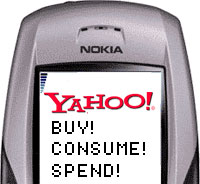 Yahoo have released a report with communications company OMD today that looks into how the Internet influences peoples shopping habits. Not surprisingly it covers online purchases, but far more interesting is how people are using the Internet and other technology to inform their ‘real-world’ purchases.
Yahoo have released a report with communications company OMD today that looks into how the Internet influences peoples shopping habits. Not surprisingly it covers online purchases, but far more interesting is how people are using the Internet and other technology to inform their ‘real-world’ purchases.
They describe it as follthows
The Internet offers a collaborative environment where consumers turn for advice and the experience of others in weighing brands, discovering alternatives and distilling prices, as they weigh their purchase decisions
We think what they mean to say is people have a look around online and read stuff, helping them to make up their minds.
They found three things that are looked up online before people cough up the cash
- Trusted information. Consumers say the Internet is the most trusted shopping information source (54 percent), followed by magazines (34 percent) and TV (23 percent). Seventy-four percent of people use trusted, familiar Web sites when purchasing online, and 55 percent opt-in for e-mail marketing messages from companies they trust.
- Choices. On average, consumers consider three brands before making a purchasing decision. Many “comparison shop” using the Internet, but 38 percent of consumers still want to be able to see and touch products before they buy. The Internet helps narrow down options before they purchase either online or offline. In addition, 61 percent agree that Internet search engines are one of their favourite tools for finding product information.
- Price. The research shows that 61 percent of people consider themselves to be serious bargain shoppers. The Internet is changing the concept of fixed pricing by enabling consumers to search for the same product at myriad prices, as well as actively monitoring a product for price discounts or finding coupons and rebate offers.
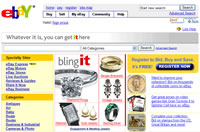
Other tools in the consumers tech-arsenal
Interestingly they’ve found that camera phones and text messages are powerful tools in the consumers tech-arsenal. Shoppers are now text messaging each other, sending pictures of merchandise and using Internet-enabled phones to compare prices, all from the point of sale (shop to you).
One of the ‘old fashioned’ methods that we’ve often used, is to call up a mate who you know will be in front of a Browser and ‘speak to them’, asking if they can check something online for you while you wait. Perhaps they didn’t mention it because it wasn’t hi-tech enough.
They also found that this has ‘given consumers a new kind of “social empowerment”‘ Oh, but of course.
Internet now first point of reference
The surprising shift is towards the Internet being the first point of reference to find out stuff. Surprising because it’s above friends and family which were always the golden choice. Less surprising is that offline reviews and traditional media sources are losing out, perhaps because people generally don’t even believe the news that they print.
 Having come from a communications agency, this report, “Long and Winding Road: The Route to the Cash Register”, won’t surprise you in using all sorts of language in a way that hasn’t ever been seen in English before. They’ll also grab hold of words that you have heard before and use them to create comfortable categories. Oh and tell you things that really are patently obvious but wrap them up in a different way ….
Having come from a communications agency, this report, “Long and Winding Road: The Route to the Cash Register”, won’t surprise you in using all sorts of language in a way that hasn’t ever been seen in English before. They’ll also grab hold of words that you have heard before and use them to create comfortable categories. Oh and tell you things that really are patently obvious but wrap them up in a different way ….
Consumers Travel Four Distinct Paths
The findings from the Long and Winding Road research can help advertisers connect with consumers online at crucial stages of the decision-making process. The study uncovers four distinct paths that consumers take on their way towards making a purchase:
- QUICK: This path involves little consideration. Consumer packaged goods are often quick paths.
- WINDING: Comparison shopping between different channels, including online and offline retailers, typifies this path. Retail goods are often winding paths.
- LONG: This path involves researching various options over an extended period of time. Technology purchases are often long paths, particularly if the price tag is high.
- LONG AND WINDING: This path requires investing a considerable amount of time researching across several channels. Many big ticket items — including automobiles and financial services — follow a long and winding path. These paths offer marketeers the most opportunity to impact and possibly sway a purchase decision in their favour, because consumers of these products are the hungriest for information.
That’s funny
We found it pretty funny that a ‘worldwide media communications specialist’ that OMD proclaim themselves to be, is the third search result for omd on Google, behind ’80s UK pop phenomenon Orchestral Manoeuvres in the Dark (OMD) and the On-line Medical Dictionary.
 Video game kings Nintendo have opened hostilities with arch-rivals Microsoft and Sony with the unveiling of its new “Wii” console.
Video game kings Nintendo have opened hostilities with arch-rivals Microsoft and Sony with the unveiling of its new “Wii” console.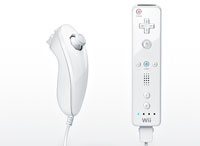 The Wii will certainly be considerably cheaper that its rivals when it goes on sale later this year, with pundits predicting a price around the $250 mark – cheaper than the Xbox 360 and around half the price of the top-of-the-range PS3.
The Wii will certainly be considerably cheaper that its rivals when it goes on sale later this year, with pundits predicting a price around the $250 mark – cheaper than the Xbox 360 and around half the price of the top-of-the-range PS3. Sporting an unusual, one-handed wireless controller, the remote control-shaped Wii handset comes with motion sensors and speakers, letting users interact with games by waving their arms about and looking like a bit of a nutter.
Sporting an unusual, one-handed wireless controller, the remote control-shaped Wii handset comes with motion sensors and speakers, letting users interact with games by waving their arms about and looking like a bit of a nutter. Nintendo reckon that users will find their one-hand, noise-making controller more fun and intuitive: “Our goal is to expand the total number of people playing games,” said Nintendo president Satoru Iwata
Nintendo reckon that users will find their one-hand, noise-making controller more fun and intuitive: “Our goal is to expand the total number of people playing games,” said Nintendo president Satoru Iwata Reggie Fils-Aime, chief marketing officer at Nintendo, was even more enthusiastic, insisting that the Wii was designed so “even your mother could use it.”
Reggie Fils-Aime, chief marketing officer at Nintendo, was even more enthusiastic, insisting that the Wii was designed so “even your mother could use it.”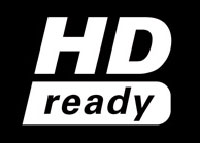 The BBC is making its first steps into the super-crisp world of high definition television (HDTV) with transmissions of Planet Earth and Bleak House in the new format at the end of this month.
The BBC is making its first steps into the super-crisp world of high definition television (HDTV) with transmissions of Planet Earth and Bleak House in the new format at the end of this month.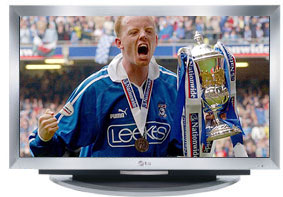 HD TV broadcasts can also beef up the whole big match experience by incorporating 5.1 surround sound and displaying the (Rooney-less) stadium action in widescreen.
HD TV broadcasts can also beef up the whole big match experience by incorporating 5.1 surround sound and displaying the (Rooney-less) stadium action in widescreen.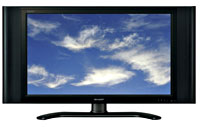 “We really feel that high definition will be the standard definition of the future,” she added.
“We really feel that high definition will be the standard definition of the future,” she added.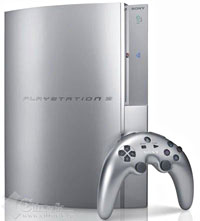 Sony has announced the pricing for its eagerly anticipated next generation PS3 console at a pre-E3 conference in Los Angeles.
Sony has announced the pricing for its eagerly anticipated next generation PS3 console at a pre-E3 conference in Los Angeles.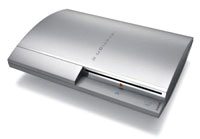 There’s certainly a lot at stake for Sony, with the company expected to lose several hundred dollars per unit – while hoping to rake in fat profits from software sales over the life of the console.
There’s certainly a lot at stake for Sony, with the company expected to lose several hundred dollars per unit – while hoping to rake in fat profits from software sales over the life of the console.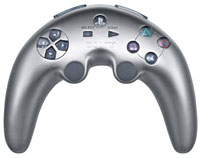 The company expects two million of the puppies to have shunted off their production line and into the shops during the ‘launch window,’ four million by the end of the year and six million worldwide by March 31, 2007.
The company expects two million of the puppies to have shunted off their production line and into the shops during the ‘launch window,’ four million by the end of the year and six million worldwide by March 31, 2007. As is now part of computer-lore, Apple Computers were called so because of the founders loves of the Beatles and their record label, Apple Corps.
As is now part of computer-lore, Apple Computers were called so because of the founders loves of the Beatles and their record label, Apple Corps. Latterly Apple Corps, with some justification, felt that Apple Computers had now entered the music business, through their iPod players and iTunes music store, so they brought legal action again.
Latterly Apple Corps, with some justification, felt that Apple Computers had now entered the music business, through their iPod players and iTunes music store, so they brought legal action again.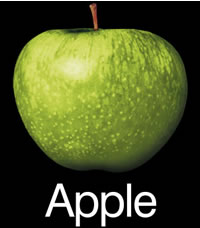 What drove the legal action?
What drove the legal action?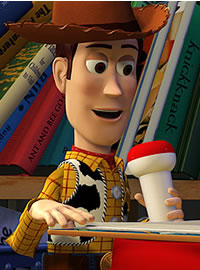 A quick catchup. We’ve been covering the
A quick catchup. We’ve been covering the  In 1998 A Bug’s Life came along also bringing $362m in worldwide ticket sales, 1999 saw Toy Story 2 ($485m). The following years saw Monsters Inc, Finding Nemo, The Incredibles all do very well, sealing Pixar as _the_ CG animation stuido.
In 1998 A Bug’s Life came along also bringing $362m in worldwide ticket sales, 1999 saw Toy Story 2 ($485m). The following years saw Monsters Inc, Finding Nemo, The Incredibles all do very well, sealing Pixar as _the_ CG animation stuido. She’s got a mission to eliminate mobile phone roaming rip-off charges. She’s Commissioner Viviane Redding of the EC, and today, Vodafone took PR action to keep itself out of her sights, by promising to “cut roaming by 40%” by this time next year.
She’s got a mission to eliminate mobile phone roaming rip-off charges. She’s Commissioner Viviane Redding of the EC, and today, Vodafone took PR action to keep itself out of her sights, by promising to “cut roaming by 40%” by this time next year.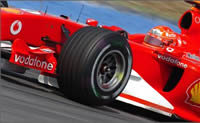 But like many of the giants, Vodafone is suffering from the cost of providing phones. All the European operators, traditionally, subsidise handsets; they give them away, or sell them for a fraction of their cost, in the expectation of making substantially more out of phone call charges – and it works.
But like many of the giants, Vodafone is suffering from the cost of providing phones. All the European operators, traditionally, subsidise handsets; they give them away, or sell them for a fraction of their cost, in the expectation of making substantially more out of phone call charges – and it works. There had been some excitement, well amongst UK media analysts at least, that BSkyB might loose its dominance of the control of UK football’s Premier League.
There had been some excitement, well amongst UK media analysts at least, that BSkyB might loose its dominance of the control of UK football’s Premier League.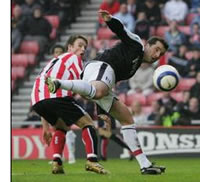 Finally the other company, Irish broadcaster Setanta, had thrown its hat into the ring, originally saying they were going to bid for two of the packages. Those not in the broadcast world wouldn’t necessarily know who Setanta are, but most people will know of their 40% owners, Benchmark Capital.
Finally the other company, Irish broadcaster Setanta, had thrown its hat into the ring, originally saying they were going to bid for two of the packages. Those not in the broadcast world wouldn’t necessarily know who Setanta are, but most people will know of their 40% owners, Benchmark Capital.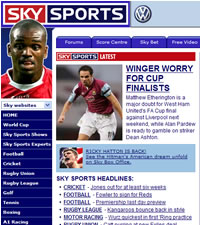 This weekend marks the start of Vodafone UK offering live coverage of international cricket and the Football League Playoffs from Sky Sports to their 3G customers.
This weekend marks the start of Vodafone UK offering live coverage of international cricket and the Football League Playoffs from Sky Sports to their 3G customers. Bizarrely, Sky specify that the content is for Personal use only. Errr … it’s on a mobile phone Sky. It’s not like you’re going to get the throngs in the pub crowding around watching it on a tiny screen. That is until someone comes up with a huge magnifying glass that the phone sits behind.
Bizarrely, Sky specify that the content is for Personal use only. Errr … it’s on a mobile phone Sky. It’s not like you’re going to get the throngs in the pub crowding around watching it on a tiny screen. That is until someone comes up with a huge magnifying glass that the phone sits behind.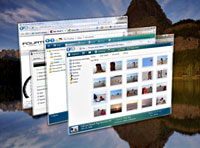 Research firm Gartner has said that it expects Vista, Microsoft’s major Windows upgrade, to not appear until the second quarter of next year.
Research firm Gartner has said that it expects Vista, Microsoft’s major Windows upgrade, to not appear until the second quarter of next year.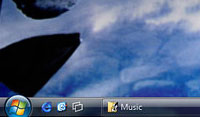 Microsoft’s current plans involve releasing Vista to manufacturing in October/November 2006 and making it available to enterprises through volume licenses by the end of this year, with the OS becoming available to computer manufacturers for shipping in January, 2007.
Microsoft’s current plans involve releasing Vista to manufacturing in October/November 2006 and making it available to enterprises through volume licenses by the end of this year, with the OS becoming available to computer manufacturers for shipping in January, 2007. “Respectfully disagreeing” with Gartner’s view, the spokesperson said that that finished Windows Vista would ship in November and January with a second beta ready to roll in the second quarter of this year.
“Respectfully disagreeing” with Gartner’s view, the spokesperson said that that finished Windows Vista would ship in November and January with a second beta ready to roll in the second quarter of this year.